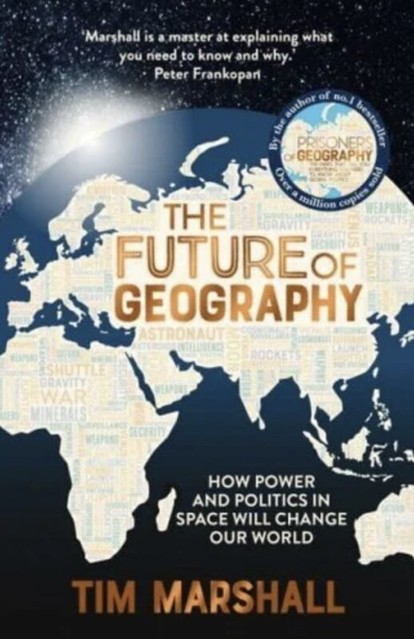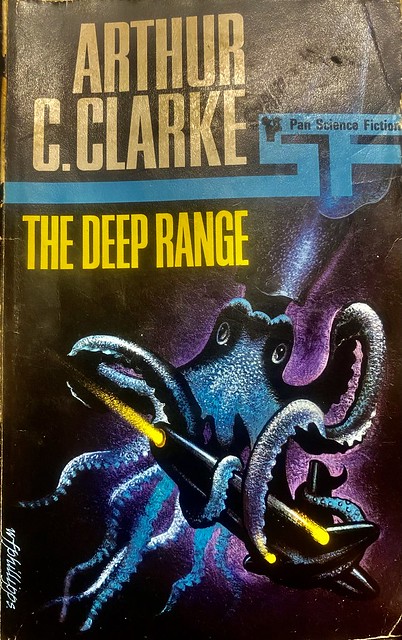 Dale E. Greenwalt: Remnants of Ancient Life There is more to fossils than bones and stones. Very rarely. soft tissue is preserved too, and Dale Greenwalt reviews what we can and cannot know about ancient life from the occasional scrap of chitin, cellulose, protein or DNA that niggardly posterity chances to leave behind. DISCLAIMER: I read a proof copy sent to me by a publication for whom I am writing a longer review.
Dale E. Greenwalt: Remnants of Ancient Life There is more to fossils than bones and stones. Very rarely. soft tissue is preserved too, and Dale Greenwalt reviews what we can and cannot know about ancient life from the occasional scrap of chitin, cellulose, protein or DNA that niggardly posterity chances to leave behind. DISCLAIMER: I read a proof copy sent to me by a publication for whom I am writing a longer review.
 Tim Marshall: The Future of Geography The High Frontier is a lawless place. But as Tim Marshall explains in this very readable guide to the latest in space exploration, the absence of rules makes space a dangerous place — for everyone on Planet Earth. The space programs of all the major and minor players are set out, as are the various dangers as they scramble for territory above our heads. It then goes all fizzy and futuristic at the end, and inexplicably misses out the most likely habitat for humans in space – hollowed-out asteroids, planetary surfaces being too difficult and expensive. DISCLAIMER: I was sent an advance copy by the publisher.
Tim Marshall: The Future of Geography The High Frontier is a lawless place. But as Tim Marshall explains in this very readable guide to the latest in space exploration, the absence of rules makes space a dangerous place — for everyone on Planet Earth. The space programs of all the major and minor players are set out, as are the various dangers as they scramble for territory above our heads. It then goes all fizzy and futuristic at the end, and inexplicably misses out the most likely habitat for humans in space – hollowed-out asteroids, planetary surfaces being too difficult and expensive. DISCLAIMER: I was sent an advance copy by the publisher.
 Robin Dennell: From Arabia To The Pacific: How Our Species Colonised Asia Our species began as a hunter of open savannah in Africa. When it left Africa into Asia, it had to contend with environments as harsh and as different as arctic tundra and tropical rainforest – which it conquered as no other species has done, simultaneously driving all other hominids to extinction. In this engaging book, archaeologist Robin Dennell explains how and why our species became so uniquely invasive. It’s an academic text, but don’t let that put you off, as it’s never less than completely readable. It is, though, printed on that shiny paper academic publishers seem to love, you know, the grade that makes even slim volumes like this weigh a ton. DISCLAIMER: I was sent a copy by the author.
Robin Dennell: From Arabia To The Pacific: How Our Species Colonised Asia Our species began as a hunter of open savannah in Africa. When it left Africa into Asia, it had to contend with environments as harsh and as different as arctic tundra and tropical rainforest – which it conquered as no other species has done, simultaneously driving all other hominids to extinction. In this engaging book, archaeologist Robin Dennell explains how and why our species became so uniquely invasive. It’s an academic text, but don’t let that put you off, as it’s never less than completely readable. It is, though, printed on that shiny paper academic publishers seem to love, you know, the grade that makes even slim volumes like this weigh a ton. DISCLAIMER: I was sent a copy by the author.
 Arthur C. Clarke: The Deep Range I seem to have lost my reading mojo, so, frustrated by a deeply cerebral novel I could barely start, let alone finish ( I might succeed one day) I turned to this good old-fashioned SF from the good old-fashioned Arthur C. Clarke, an undemanding adventure in which a washed-up astronaut conquers his fears of space by mastering the secrets of the deep. It was written in 1957, and it shows, but I’ll make no apology for having enjoyed every minute.
Arthur C. Clarke: The Deep Range I seem to have lost my reading mojo, so, frustrated by a deeply cerebral novel I could barely start, let alone finish ( I might succeed one day) I turned to this good old-fashioned SF from the good old-fashioned Arthur C. Clarke, an undemanding adventure in which a washed-up astronaut conquers his fears of space by mastering the secrets of the deep. It was written in 1957, and it shows, but I’ll make no apology for having enjoyed every minute.

